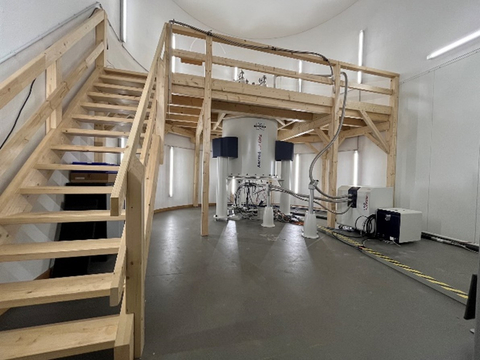Bruker Announces Successful Installation of a 1.2 GHz NMR at the Leibniz Forschungsinstitut für Molekulare Pharmakologie (FMP) in Berlin
The Avance® 1.2 GHz NMR system will enable advanced studies of biomolecular structures and function in structural biology, pharmacology, and cellular biology

New 1.2 GHz Avance® NMR system at Forschungsinstitut für Molekulare Pharmakologie (FMP) in
Ultra-high field NMR is a vital tool in pharmacology research, providing unique insights into molecular dynamics and structural rearrangements related to drug-target binding, protein interactions, and macromolecular structure refinements and rearrangements. Intrinsically disordered proteins (IDPs) play key roles in cell biology, such as IDPs implicated in cancer and infectious diseases. IDPs can be studied in depth using GHz-class NMR, by taking advantage of increased resolution of 1.2 GHz NMR. Researchers can gain an understanding of the conformational dynamics and function of IDPs to unlock the secrets of these important proteins and their role in diseases. This makes 1.2 GHz NMR a powerful tool for advancing our understanding of cellular and disease biology, and the development of therapies.
The Leibniz Forschungsinstitut für Molekulare Pharmakologie is a respected research institute committed to advancing the field of molecular pharmacology through groundbreaking research and innovation. Since 1995, the institute has integrated eleven NMR systems, including the recently installed 1.2 GHz AVANCE® NMR spectrometer. Dr. Peter Schmieder, Head of FMP's NMR platform, stated: "At FMP, we have witnessed the evolution of NMR over almost 30 years, with each step forward bringing new research opportunities. The 1.2 GHz instrument is the next step and we are excited about the new opportunities.”
Professor Hartmut Oschkinat, whose scientific work and persistence were essential for the realization of the 1.2 GHz system, added: “With the 1.2 GHz instrument, we are entering a new realm of unimagined possibilities, thanks to the unwavering commitment of our partners at Bruker to drive innovation in NMR."
The new device will serve FMP groups that are dedicated to advancing the molecular basis of pharmacological therapies by characterizing novel active compounds and mechanisms of action prior to drug development. Professor Adam Lange, Head of the Structural Biology Department, and his group focus on membrane proteins in native-like lipid bilayers and supramolecular assemblies.
Professor Lange commented: "The enhanced resolution and sensitivity of this GHz-class instrument are game-changers for our work, allowing us to detect the architecture and motion of proteins with even greater accuracy and detail to further advance our understanding of cellular molecular machines."
The Integrated Structural Dynamics team, led by Junior Group Leader Dr. Sigrid Milles, is dedicated to studying clathrin-mediated endocytosis, a crucial cellular uptake pathway. "The intricate interaction network of intrinsically disordered proteins involved in clathrin-mediated endocytosis has long been a mystery. With GHz-class NMR, we can now investigate the large IDPs that are active in the early phases of endocytosis at exceptional resolution to better understand the molecular dynamics of this important process," said Milles. "Our goal is to gain new insights into how cells take in molecules, which could ultimately lead to the development of new therapies for diseases."
Dr. Falko Busse, President of Bruker BioSpin, added: “Bruker is privileged to partner with the Leibniz Forschungsinstitut für Molekulare Pharmakologie (FMP), providing GHz-class NMR to their scientists. This can further accelerate the groundbreaking research in molecular pharmacology by FMP researchers and we are honored to contribute to such invaluable work and look forward to the scientific and medical discoveries that FMP's research will bring to society."
About Bruker Corporation – Leader of the Post-Genomic Era (Nasdaq: BRKR)
Bruker is enabling scientists and engineers to make breakthrough post-genomic discoveries and develop new applications that improve the quality of human life. Bruker’s high performance scientific instruments and high value analytical and diagnostic solutions enable scientists to explore life and materials at molecular, cellular, and microscopic levels. In close cooperation with our customers, Bruker is enabling innovation, improved productivity, and customer success in post-genomic life science molecular and cell biology research, in applied and biopharma applications, in microscopy and nanoanalysis, as well as in industrial and cleantech research, and next-gen semiconductor metrology in support of AI. Bruker offers differentiated, high-value life science and diagnostics systems and solutions in preclinical imaging, clinical phenomics research, proteomics and multiomics, spatial and single-cell biology, functional structural and condensate biology, as well as in clinical microbiology and molecular diagnostics. For more information, please visit www.bruker.com.
View source version on businesswire.com: https://www.businesswire.com/news/home/20240702500630/en/
Investor:
Justin Ward
Sr. Director, Investor Relations & Corporate Development
Bruker Corporation
T: +1 (978) 313-5800
E: Investor.Relations@bruker.com
Media:
Markus Ziegler
Sr. Director and Head of Group Marketing
Bruker BioSpin
T: +49 172 3733531
E: pr@bruker.com
Source: Bruker Corporation







